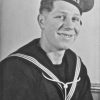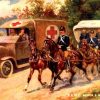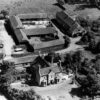6. Return to Suffolk
Crabbe 1792 - 1805
By Kate Pugh
Pluralism and Patronage and Politics in the 18th Century Church
It must be stressed that Crabbe’s pluralism and absenteeism were completely normal in the worldly Anglican church of the time. Characters in the novels of Jane Austen discuss whether to enter the army, the law or the church. It was a career option, not a vocation. Success depended on patronage, not piety. Since many livings yielded very little, pluralism was often a necessity. In over half the parishes in the land the place of the absent rector was taken by a curate. Theoretically, academic qualifications were required before ordination. Crabbe’s name was entered on the boards of Trinity College, Cambridge, which still claims him as one of its distinguished alumni, by his friend the Bishop of Landaff, so that he would be awarded a degree after a certain number of terms without ever having to attend the university. If, as in Crabbe’s case, this took too long, it was possible to award a ‘Lambeth’ degree, which involved only a two hour examination.
The Bishop of Landaff, Dr Watson, offers an interesting example. He was Bishop of Landaff for 34 years without ever living in Landaff, held 16 other benefices, and exchanged his Cambridge chair of Chemistry for a chair in Divinity because it paid more. Yet Dr Watson was not personally corrupt, he believed sincerely in inculcating the ‘principles of piety, of benevolence and of self-government’. He agitated for church reform and was thus regarded as politically dangerous. It would be equally unfair to regard Crabb’s absenteeism and pluralism as evidence of insincerity or indolence. Most of the evidence shows him to have been a sincere Christian and, by the standards of the time, a reasonably conscientious clergyman.(1)
Suffolk
During the thirteen years he spent in Suffolk Crabbe pursued the same activities as in Leicestershire: botany, entomology, geology. He taught himself French and Italian, wrote three novels which he later destroyed and began to compose The Parish Register. He was apparently a popular preacher to large congregations. ‘In the pulpit he was entirely unaffected -read his sermon with earnestness, and in a voice and manner … particularly affecting …'(2)
In March 1796 the Crabbe’s third son, Edmund, died aged six. Crabbe wrote to Edmund Cartwright: ‘your godson was suddenly taken from us by a severe and (to me) unknown disease … his mother has suffered too much in her mind and from too many causes not to escape the effects of mental distress on the female frame: she bore much, and with hope and a conscientious discharge of her duty … she combated the too evident progress of those nervous disorders which render life so grievous to be born‘ (3)
Sarah
Sarah Crabbe had endured the death of four of her six children. There was nothing unusual in this, but the fact that it was commonplace did not necessarily make it less devastating. This death was the more painful because this child had survived longer. Crabbe hoped that Sarah would recover from her depression, but she did not. ‘The loss of this child was so severely felt by my mother, that it caused a nervous disorder from which she never entirely recovered’. During the rest of her life she was subject to increasingly extreme manic-depressive mood swings, ‘during the hotter months of almost every year, she was oppressed by the deepest dejection of spirits I ever witnessed … there were long intervals in which, if her spirits were a little too high, the relief to herself and others was great in deed.'(4) Crabbe’s most recent biographer, Neil Powell, believes these mood swings may have been caused by opium, which was commonly prescribed at the time and which Crabbe himself took for many years.
Pretyman’s Edict
In July 1800 Dr George Pretyman, Bishop of Lincoln indicated to the non resident clergymen in his Diocese that he expected them to return to their livings. Since Pretyman himself was also Dean of St Paul’s, a position not entirely compatible with a northern bishopric, he did not provide a very good example. Crabbe’s Suffolk patron, Dudley North, used his influence to prolong Crabbe’s stay in Suffolk for a further four years, but in 1805 the family went back to Leicestershire.
References
(1) Bareham
(2) Life pp 191-192
(3) Letters, Letter to Edmund Cartwright senior, 7th July 1796
(4) Life pp 148-155















No Comments
Add a comment about this page